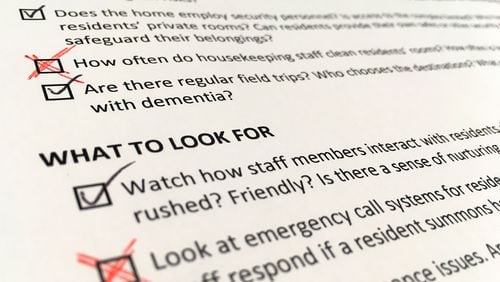Chandeliers, bistros and theater seating are nice, but these amenities are window dressing. When you’re looking at assisted living or personal care homes, you need to ask the right questions and look for the telltale signs to be confident you or your loved one will receive proper care.
WHAT TO ASK
- How many personal care workers are employed? Do they have other duties, such as housekeeping or cooking, in addition to helping residents? What is the staff-to-resident ratio?
- What qualifications are required of staff for employment? How long have key staff been there?
- Who is involved with administering medications? Are they nurses? If not, what kind of training do they receive?
- Does the home use a person-centered approach that allows a resident to set the schedule for getting up, going to bed and eating? Or must residents conform to a home's set schedule and plans?
- Is there a rotation of menu items? Do residents have menu choices? What hours are meals served? How much time are residents allowed to get to the cafeteria and eat?
- In caring for those with dementia, what is the home's approach to challenging situations? In memory care, what security measures help prevent residents from eloping?
- Does the facility have assistive devices to prevent falls? How is the staff trained on identifying and addressing fall risks?
- Does the home employ security personnel? Is access to the complex limited? Who has access to residents' private rooms? Can residents provide their own safes or other security devices to safeguard their belongings?
- How often do housekeeping staff clean residents' rooms? How often is laundry done?
- Are there regular field trips? Who chooses the destinations? What outings are available for those with dementia?
WHAT TO LOOK FOR
- Watch how staff members interact with residents during meals or other times. Do they seem rushed? Friendly? Is there a sense of nurturing and community?
- Look at emergency call systems for resident rooms. Where are they located? How quickly does staff respond if a resident summons help?
- Note any maintenance issues. Are carpets clean? Furnishings in good repair?
- Read the contract carefully. Regardless of any promises a facility may make, the contract is the binding document, so ask that additions are made to reflect promised services. For example: Is transportation to medical appointments provided? Is arbitration required to resolve disputes? What does the contract say about fees? When can a resident can be required to move out?
- Ask to see Department of Community Health inspections for the past two years.
- Ask to see the latest Department of Public Health food facility inspection report. Ask for the latest inspection report by the fire marshal.
- Look at the patio and other outdoor spaces and any common areas, such as a TV room, library or art room. Do they seem spacious enough for group gatherings? Are they well maintained?
THINGS TO THINK ABOUT
- Make sure you are considering the needs of your loved one and not your own. That applies to a facility's decor, social activities and care needs.
MORE LINKS AND RESOURCES:
Thomas steadies himself in the wind and rain at Troon for early British Open lead
WNBA players' union head concerned league is being undervalued in new media deal
Closing arguments in espionage trial of Wall Street Journal reporter will be Friday, court says
Subtle signs of an unhealthy gut, from skin issues to sugar cravings
